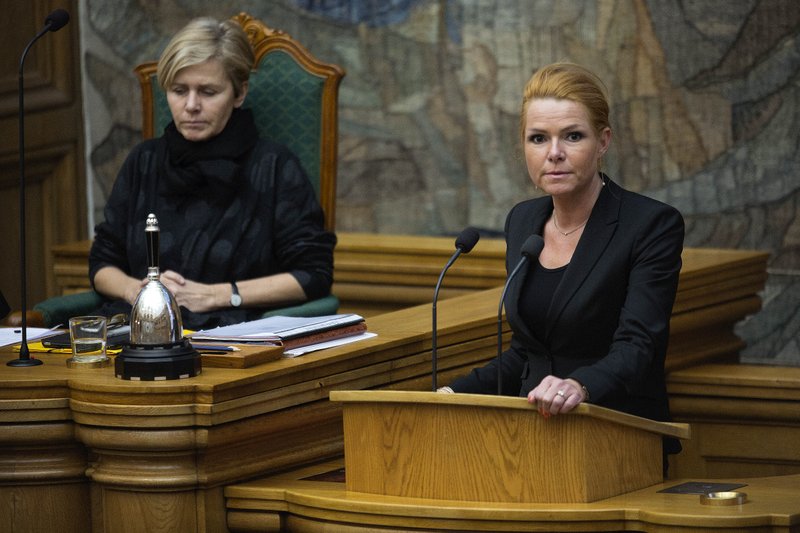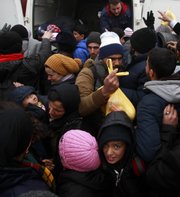COPENHAGEN, Denmark -- Danish lawmakers voted Tuesday to let police seize valuables worth more than $1,450 from asylum seekers to help cover their housing and food costs while their cases are being processed.
The government has said that passing the law was the right thing to do and was meant to help pay for migrants' expenses. Although the law applies only to Denmark, the legislation follows efforts by other members of the European Union to enact their own laws that outside groups have called anti-immigration.
After more than three hours of debate, the ruling Liberal Party's bill was adopted in an 81-27 vote, with the support of the opposition Social Democrats and the anti-immigration Danish People's Party -- Denmark's two largest parties. One lawmaker abstained and 70 others were absent.
Amendments were made, including raising the value of items the asylum seekers can keep from $440 to $1,450. That puts it in line with welfare rules for Danes, who must sell assets worth more than $1,450 before they can receive social benefits.
Denmark, with a population of 5.6 million, received about 20,000 asylum seekers last year, one of the highest rates per capita in the EU.
"We are talking about a real exodus," said Martin Henriksen, spokesman for the populist Danish People's Party. "More needs to be done. We need more border controls. We need tighter immigration rules."
Stephane Dujarric, spokesman for the United Nations secretary-general, criticized Denmark, saying people who make the effort to reach Europe "should be treated with compassion and respect" and with full rights as refugees.
The United Nations High Commissioner for Refugees has said the law "could fuel fear, xenophobia and similar restrictions that would reduce -- rather than expand -- the asylum space globally and put refugees in need at life-threatening risks."
The Danish government has repeatedly argued that the bill has largely been misunderstood abroad. Prime Minister Lars Loekke Rasmussen has called it the "most misunderstood law" in the country's history.
"No, we are not going to take the jewelry away from people," Jakob Ellemann-Jensen, spokesman for the Liberal Party, told CNN earlier this month. "I mean, this is outrageous. We would never do this."
Two small centrist parties and two left-leaning groups opposed the law and criticized the government for tightening Denmark's immigration laws.
"This is a symbolic move to scare people away" from seeking asylum in Denmark, said Johanne Schmidt-Nielsen of the Red-Green Alliance, which opposed the law. Her party colleague Henning Hyllested called the law "sickly nationalism."
Other Danish politicians have countered that the law is in line with the nature of the Danish welfare state. In a welfare state, they argued, everyone needs to use up their own resources before receiving benefits.
"Those people who can manage by themselves shouldn't have assistance from the state," Migration Minister Inger Stoejberg told EU lawmakers.
But a 24-year-old migrant from Afghanistan, Feraidoon Ferogh, offered a different insight.
"I don't think anyone who comes here has 10,000 kroner [$1,450], because if I had 10,000 kroner I wouldn't be here," he said.
In December, The Washington Post asked the Danish Integration Ministry via email to define what kind of items the country would seize.
At the time, the government replied: "It is explicitly mentioned in the bill before Parliament that the new rule on seizure will only apply to assets of a considerable value. Thus, foreigners will always be able to keep assets which are necessary to maintain a modest standard of living, e.g. watches and mobile phones. ... Furthermore, assets which have a certain personal, sentimental value to a foreigner will not, as a main rule, be seized unless they have considerable value."
Denmark is not the only country taking such action. Some German states do take funds from refugees, and Switzerland requires asylum seekers to hand over cash of more than $996.
The bill was part of a series of measures that included extending from one year to three the period that family members must wait before they can join a migrant in Denmark. Denmark already tightened its immigration laws last year, reducing benefits for asylum seekers, shortening temporary residence permits and stepping up efforts to deport those whose applications are rejected.
Controlling borders
Elsewhere in Europe, the Czech and Slovak prime ministers called on the EU to form a 'Plan B' in case Greece can't manage the influx of migrants through its territory.
Speaking Tuesday from the Slovak capital of Bratislava, Bohuslav Sobotka of the Czech Republic and Robert Fico of Slovakia said that to protect the European visa-free Schengen travel zone, the 28-nation bloc should take necessary measures on Greece's northern borders with Macedonia and Bulgaria.
Greece, which shares a land border with Turkey but has seen the most migrants making quicker but more dangerous voyages across the Aegean Sea, has borne the brunt of hundreds of thousands seeking to escape war and poverty for better life in Europe.
Once people seeking asylum arrive in the EU, they must register and stay in the country of entry, but most migrants who travel to Greece want to push farther north to more affluent countries such as Germany and Sweden.
More than 850,000 people, most fleeing conflict in Syria and Afghanistan, entered Greece by sea in 2015. Some European countries, including Slovakia, have blasted Greece for being unable to secure its border, which forms part of the Schengen area.
After the two leaders met, Fico said: "Macedonia and Bulgaria could play a key role in protecting the Schengen border."
The two countries already agreed to deploy police forces in Macedonia.
In addition to border controls, some national governments of EU members in eastern Europe have criticized the bloc's plans to redistribute the migrants based on quotas per country.
Poland's interior minister said Tuesday that Warsaw will veto any plan by the EU that would oblige member states to accept set numbers of migrants.
Last year, Poland and other countries in the region opposed a plan to redistribute more than 120,000 migrants from Africa and the Middle East among the EU members. Warsaw agreed to accept no more than 7,000 asylum seekers, but not economic migrants, by the end of 2017.
Mariusz Blaszczak said that Poland would veto any new relocation plan that would impose a quota of migrants to be accepted, saying such a plan would encourage more arrivals.
Poland said the migrants should be helped outside Europe, at refugee camps close to their home countries.
Some 53 percent of Poles are against accepting any migrants, while 41 percent are for offering them temporary shelter only, according to a poll released Tuesday by the CBOS survey center. Only 4 percent of respondents said Poland should allow migrants to settle permanently. The poll conducted from Jan. 7-14 surveyed 1,063 adults and had a margin of error of plus or minus 3 percentage points.
Blaszczak also said that Poland will "most probably" introduce temporary border controls in July when it will host a high-level NATO gathering and a world youths' meeting with Pope Francis.
Information for this article was contributed by Jan M. Olsen, Cara Anna, David Keyton and staff members of The Associated Press; and by Rick Noack of The Washington Post.
A Section on 01/27/2016




